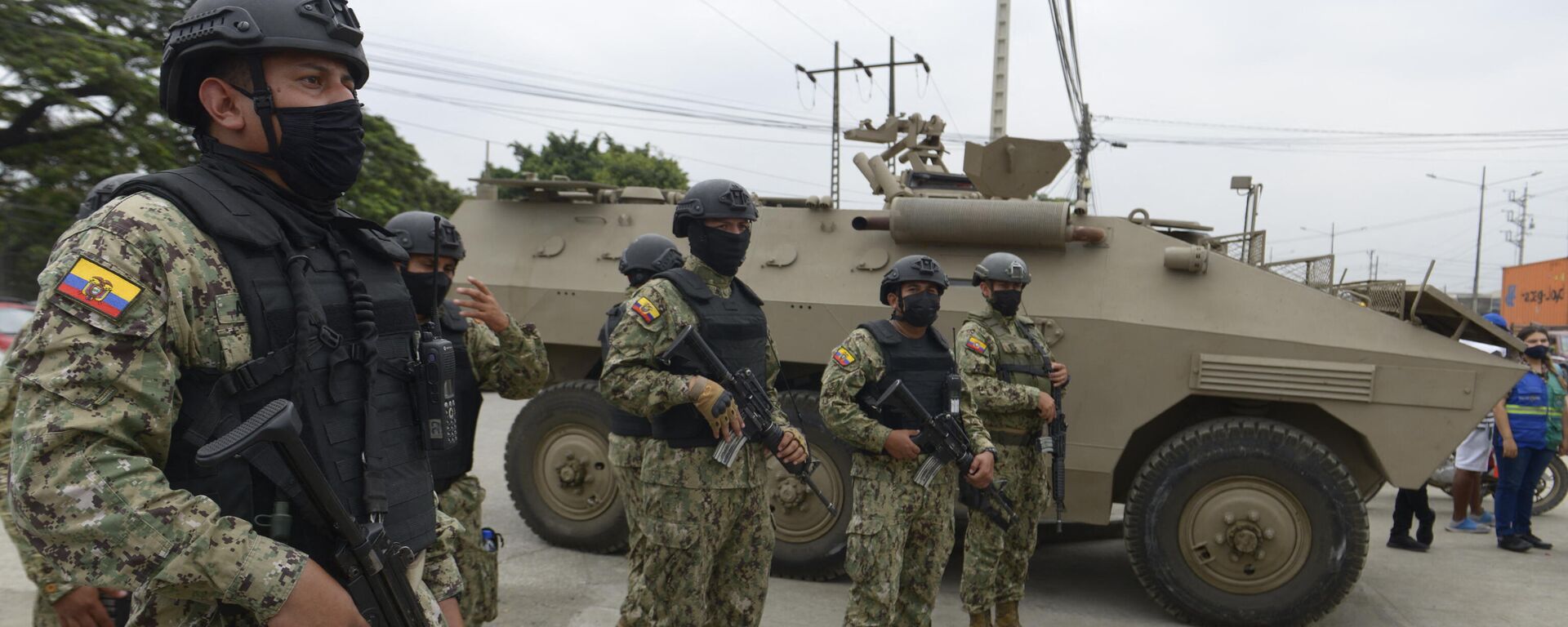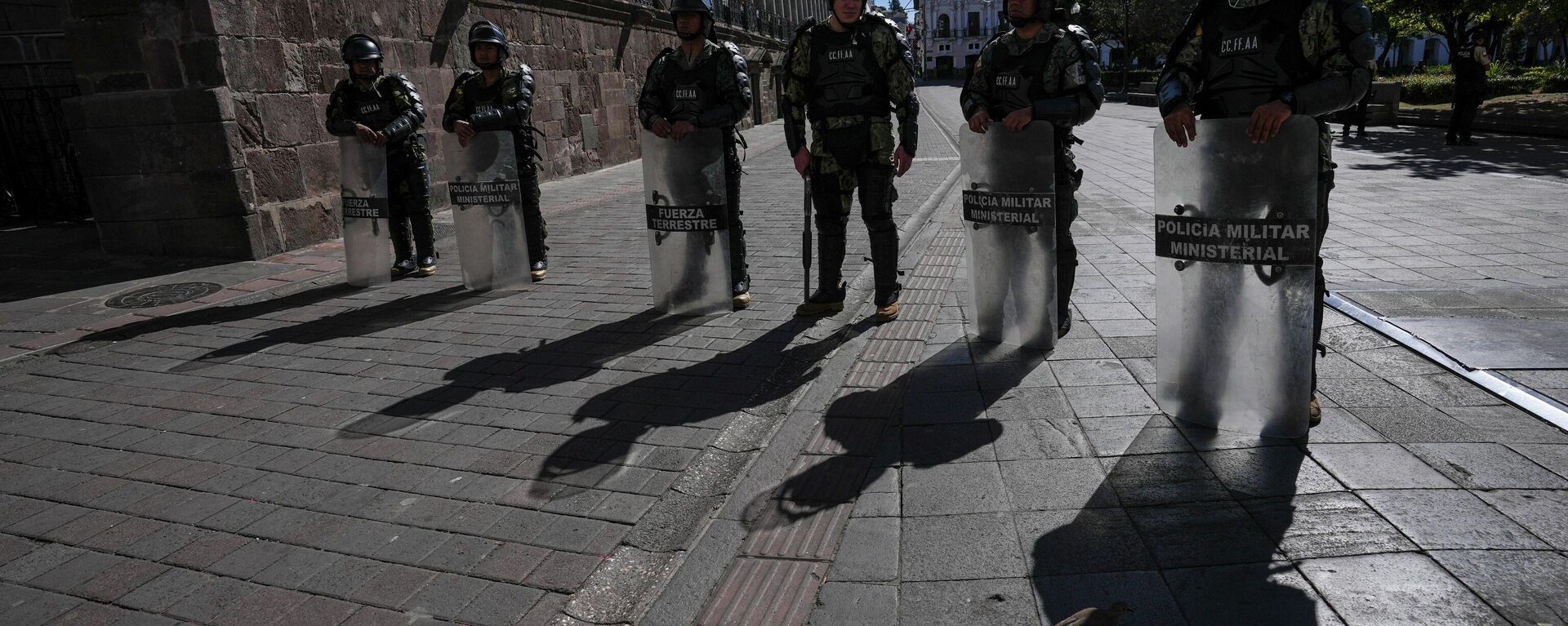https://sputnikglobe.com/20240120/gang-violence-bad-economics--cia-asset-as-president-whats-behind-ecuadors-crisis-1116281431.html
Gang Violence, Bad Economics & CIA Asset as President? What’s Behind Ecuador’s Crisis
Gang Violence, Bad Economics & CIA Asset as President? What’s Behind Ecuador’s Crisis
Sputnik International
Sputnik’s Fault Lines program looks at the political and economic failures behind the rise of gang violence in the South American country.
2024-01-20T02:25+0000
2024-01-20T02:25+0000
2024-01-25T18:16+0000
analysis
ecuador
drug dealer
us
cia
fault lines
lenin moreno
corruption
gang violence
criminal organizations
https://cdn1.img.sputnikglobe.com/img/07e8/01/14/1116281771_0:0:3068:1727_1920x0_80_0_0_c0ec415715e0205e41c55885f177d787.jpg
Ecuador made world headlines earlier this month with reports of a shocking outbreak of gang violence in the small South American nation. Armed men commandeered a state broadcasting headquarters, taking the host hostage on live television in a brazen display of lawlessness. Coming just months after the assassination of presidential candidate Fernando Villavicencio, the event cemented the impression of a country held captive by drug cartel brutality.How did Ecuador go from a nation with a thriving economy and impressive progress in poverty reduction to a haven for organized crime in just a few short years? Journalist Esteban Carrillo joined Sputnik’s Fault Lines program Friday to offer his insight.“It is the gangs who have all of the leverage here because they have accumulated so much power, to the point that they can do these things and almost face no retaliation,” said the Ecuador-born reporter. “These raids, these arrest campaigns, everything that the government is attempting to do – it looks good on camera and it might work for a couple of weeks. But what is going to happen next?”“The prisons are not run by the police, they're not run by the government, they're not run by prison authorities, they're run by the gangs. And this has been the case in Ecuador since at least 2018, when the gangs were handed over control to the prisons and inside the prisons, inmates were no longer divided amongst the severity of their crimes but their gang affiliation. So the prisons became the source of the violence that we're seeing now on the street.”Carrillo laid the blame for the prison violence and rise of gangs in the country on Ecuador’s failed neoliberal economic policy under a succession of presidential administrations.The journalist explained that Ecuador’s wealthy elite were eager to change the country’s course after former President Rafael Correa’s presidency, pushing for major cuts in government spending. Observers believed Correa’s populist “Citizen’s Revolution” was in safe hands when his predecessor Lenin Moreno was elected in 2017. But Moreno radically altered government policy, even criminally persecuting Correa’s supporters.Moreno’s dramatic 180 caused many, including the country’s former foreign minister, to conclude Moreno had become an asset of the US Central Intelligence Agency.The discovery of Moreno’s hidden assets with the release of the Panama Papers solidified the impression the former president was being extorted.Carrillo also pointed to the precarious employment and rising poverty in Ecuador creating fertile ground for the growth of the cartels. “About seven out of every 10 people in Ecuador do not have what is considered proper employment,” he noted. “They don't have Social Security, they don't have a signed contract, they have casual employment. And then you have poverty on the rise and migration levels are through the roof.”The economic instability creates an environment for organized crime to fill the void, as in other Latin American countries where US-backed neoliberal policy has resulted in the same consequences.
https://sputnikglobe.com/20240110/crumbling-state--cocaine-superhighway-whats-stoking-ecuadors-explosion-of-gang-violence-1116101048.html
https://sputnikglobe.com/20230817/political-violence-in-ecuador-rooted-in-neoliberalism-subservience-to-the-us--1112660079.html
Sputnik International
feedback@sputniknews.com
+74956456601
MIA „Rossiya Segodnya“
2024
John Miles
https://cdn1.img.sputnikglobe.com/img/07e8/01/19/1116388787_0:0:1316:1316_100x100_80_0_0_77e70d36afd983012b1c5d38ddb84156.jpg
John Miles
https://cdn1.img.sputnikglobe.com/img/07e8/01/19/1116388787_0:0:1316:1316_100x100_80_0_0_77e70d36afd983012b1c5d38ddb84156.jpg
News
en_EN
Sputnik International
feedback@sputniknews.com
+74956456601
MIA „Rossiya Segodnya“
Sputnik International
feedback@sputniknews.com
+74956456601
MIA „Rossiya Segodnya“
John Miles
https://cdn1.img.sputnikglobe.com/img/07e8/01/19/1116388787_0:0:1316:1316_100x100_80_0_0_77e70d36afd983012b1c5d38ddb84156.jpg
ecuador violence, colombian cartels, ecuador presidential candidate assassinated, murdered, ecuador turmoil, ecuadorian gang leaders, president daniel noboa, fabricio colon pico, adolfo macias, drug cartels, cocaine superhighway, riots across ecuador, prison riots, los lobos, los choneros, criminal gang, criminal organization
ecuador violence, colombian cartels, ecuador presidential candidate assassinated, murdered, ecuador turmoil, ecuadorian gang leaders, president daniel noboa, fabricio colon pico, adolfo macias, drug cartels, cocaine superhighway, riots across ecuador, prison riots, los lobos, los choneros, criminal gang, criminal organization
Gang Violence, Bad Economics & CIA Asset as President? What’s Behind Ecuador’s Crisis
02:25 GMT 20.01.2024 (Updated: 18:16 GMT 25.01.2024) Sputnik’s Fault Lines program looks at the political and economic failures behind the rise of gang violence in the South American country.
Ecuador made world headlines earlier this month with reports of a shocking outbreak of gang violence in the small South American nation. Armed men commandeered a state broadcasting headquarters, taking the host hostage on live television in a brazen display of lawlessness. Coming just months after the
assassination of presidential candidate Fernando Villavicencio, the event cemented the impression of a country held captive by drug cartel brutality.
How did Ecuador go from a nation with
a thriving economy and impressive progress in poverty reduction to a haven for organized crime in just a few short years? Journalist Esteban Carrillo joined
Sputnik’s Fault Lines program Friday to offer his insight.
“It is the gangs who have all of the leverage here because they have accumulated so much power, to the point that they can do these things and almost face no retaliation,” said the Ecuador-born reporter. “These raids, these arrest campaigns, everything that the government is attempting to do – it looks good on camera and it might work for a couple of weeks. But what is going to happen next?”
“The prisons are not run by the police, they're not run by the government, they're not run by prison authorities, they're run by the gangs. And this has been the case in Ecuador since at least 2018, when the gangs were handed over control to the prisons and inside the prisons, inmates were no longer divided amongst the severity of their crimes but their gang affiliation. So the prisons became the source of the violence that we're seeing now on the street.”
Carrillo laid the blame for the prison violence and rise of gangs in the country on Ecuador’s failed neoliberal economic policy under a succession of presidential administrations.
“It's all under this idea of shrinking the state,” Carillo explained. “That means if there's a ministry or a secretariat that is in charge of the prisons, then you fold that into another ministry, and then you fold those two into another ministry, and all of a sudden you have mass layoffs and you have this state that shrinks to the point of disappearing… We are a narco state because the government has absolutely lost all of the control that it has.”

10 January 2024, 18:17 GMT
The journalist explained that Ecuador’s wealthy elite were eager to change the country’s course after former President Rafael Correa’s presidency, pushing for major cuts in government spending. Observers believed Correa’s populist “Citizen’s Revolution” was in safe hands when his predecessor Lenin Moreno was elected in 2017. But Moreno radically altered government policy, even criminally persecuting Correa’s supporters.
Moreno’s dramatic 180 caused many, including the country’s former foreign minister, to conclude Moreno had become an asset of the US Central Intelligence Agency.
“Moreno became a CIA insider due to blackmailing,”
said ex Foreign Minister Ricardo Patiño to Sputnik in 2019. “We are absolutely sure that while Moreno was in Geneva [working as a UN envoy] he established a very close relationship with the CIA and the US administration because they may have found his secret bank accounts in Panama, opened by his brother to save money from corruption.”
The discovery of Moreno’s hidden assets with the release of the
Panama Papers solidified the impression the former president was being extorted.
Carrillo also pointed to the precarious employment and rising poverty in Ecuador creating fertile ground for the growth of the cartels. “About seven out of every 10 people in Ecuador do not have what is considered proper employment,” he noted. “They don't have Social Security, they don't have a signed contract, they have casual employment. And then you have poverty on the rise and migration levels are through the roof.”
The economic instability creates an environment for organized crime to fill the void, as in other Latin American countries where US-backed neoliberal policy has
resulted in the same consequences.

17 August 2023, 03:40 GMT





